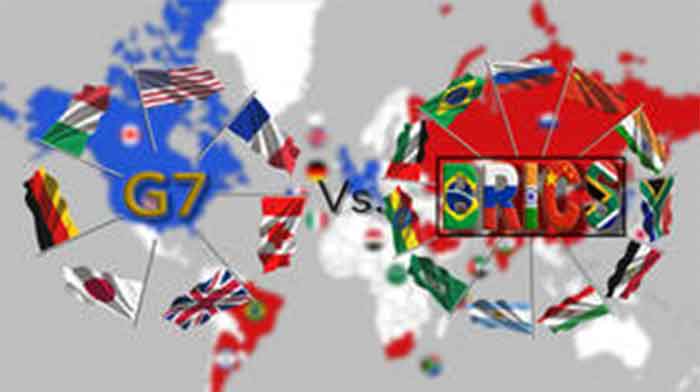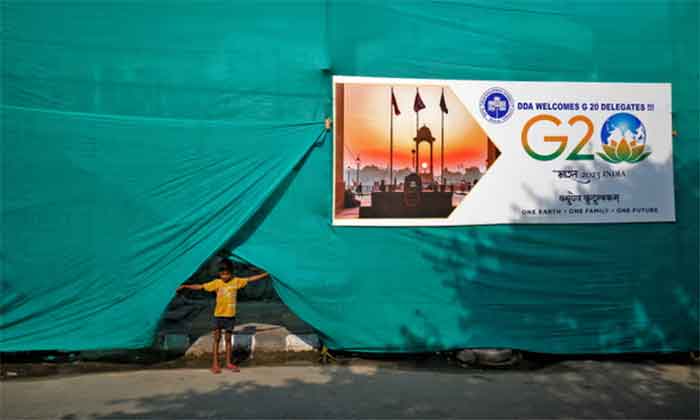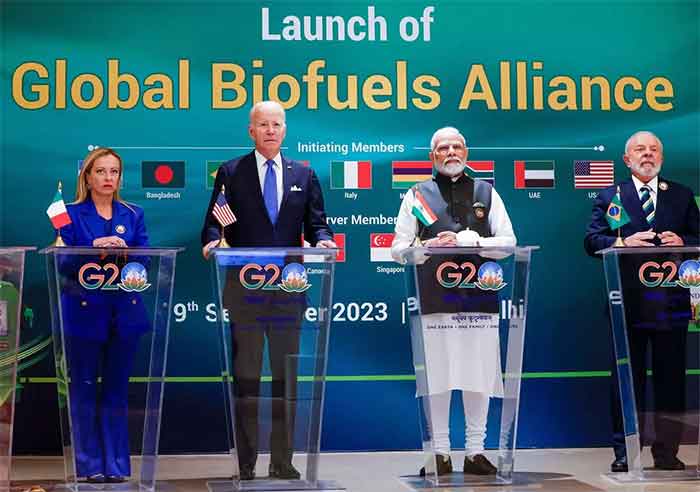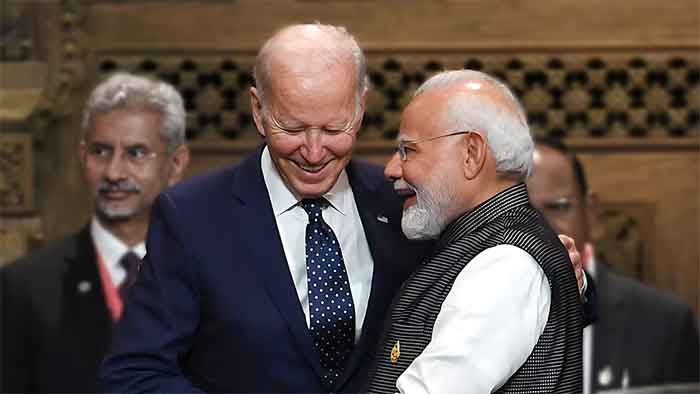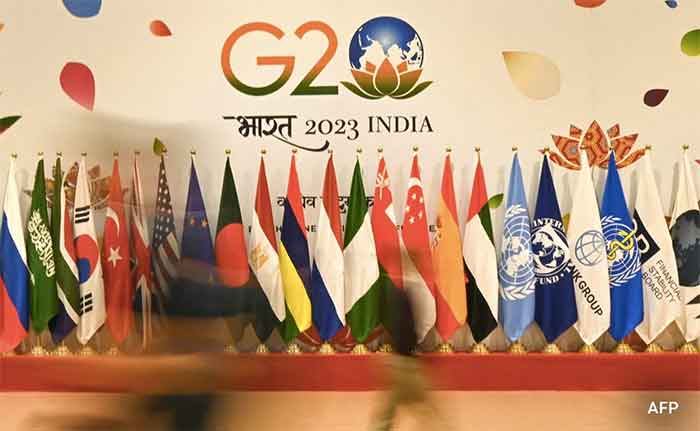
It is a very commendable effort that the G-20 Summit could issue a common declaration with consensus. The most praiseworthy part of this declaration is the basic precept given on the cover of the declaration—One Earth, One family, One Future. The very first sentence of the declaration says—We are One Earth, One Family, and we share One Future. In keeping with this precept, the declaration also asserts that this is not the era for wars and the world should instead have a common increased commitment to protection of environment, justice, sustainable livelihoods and sustainable development goals.
All this is very good, but as soon as we compare this with the reality of the present day world, we realize how much the world falls short of these ideals. A relatively smaller part of this reality is also reflected in this declaration. However the overall reality is much more grim. There is a very dangerous quest for world dominance which can lead the world to more dangerous wars than ever before in the near world. It is good that the G-20 declaration has warned specifically against the use of nuclear weapons, but the reality cannot be ignored that the world has been getting closer to this in recent times. The quest for world dominance and the violence this unleashes can take the world much further away from the objectives of environment protection and sustainable development which have been emphasized so much in this declaration.
Nevertheless, it is good that the G-20 could at least say with consensus that these countries in principle accept the most noble precept of one earth, one family and one shared future. In this context this may be a good time to raise the concept of a world government, at least in the context of resolving those most serious problems which threaten the life-nurturing conditions of our planet. Earlier the concept of one world government was emphasized by some of the most prominent of world’s leaders known for their deep commitment to peace. Mahatma Gandhi and Jawaharlal Nehru, Albert Einstein and Martin Luther King were all committed to this. Nehru said, “I have no doubt in my mind that the World Government must come and will come for there is no other remedy to the world’s sickness.” Albert Einstein was even more emphatic when he stated—“With all my heart I believe that the world’s present system of sovereign nations can only lead to barbarism, war and inhumanity. Mankind’s desire for peace can be realized only by the creation of a world government.”
Wendell Wilkie had contested the US presidential election unsuccessfully, but he went much beyond the narrow agenda of this when he saw firsthand the devastation wrought by World War II. He now advocated that the USA should be free of ‘international imperialism’ of Europeans and should strive for “equality of opportunity for every race and every nation’, while at the same time not hesitating to criticize the “race imperialism” within the USA. He wrote the widely read book ‘One World’ but tragically died soon after in 1944 before he could take forward his new vision further.
So clearly the concepts of One World and even World Government, linked to peace and justice, have been advocated by some very wise leaders of world in the past and the challenge before us now is to relate these to the most pressing needs of our times, more particularly to resolving the survival crisis.
As this is a big issue and would involve big changes not normally considered these days, it would be better to suggest various variants of the changes and reforms that can be considered, instead of placing just one version for discussion. A wider discussion can then reveal what can be more practical and doable. A United Nations type of representation at world level is not adequate, as here a country gets in one representative with one vote regardless of whether its population is one million or one billion. The representative is not elected but appointed by the government—which may be highly authoritarian and human rights violator. Finally five countries, which have the most weapons of mass destruction and are the most frequent invaders, have a veto power. Hence it is important to go into concepts of world government which go much beyond the United Nations or its basic pattern.
Here, before proceeding further, we may also consider the related beautiful concept of ‘Earth without Borders’ (incidentally also the title of a recent book by this writer). This is often used to convey the idea that those who work with a spirit of serving humanity should not be confined merely to serving their own country, but can be used to convey much wider changes as well, as was the purpose of my book.
Clearly a profession like that of doctors ideally should serve those who need care the most. Hence the USA may be attacking Iraq at a point of time but a US doctor may go to heal the people of Iraq injured in a bombing attack as she feels that it is these innocent victims who need her care the most. Hence we have the concept of doctors without borders or doctors without frontiers which has been taken forward by several senior and eminent public-spirited doctors in recent times.
Similarly we can speak of public service by other professions going beyond any narrow thinking to serve the entire humanity based on where it is needed the most. This includes the concept of journalists without borders and writers without borders, of course. Somewhat similar is the commitment to one world. In this thinking public spirited professionals such as doctors say that they regard the entire world as one, all people as one people, and they do not discriminate among them. They are willing and eager to serve anyone anywhere depending on where their services are needed more.
This concept has been important also for the spread of philanthropic activities to those areas where their care is needed the most as thousands of people have been enduring great risks and hardships to work in the most risky and difficult zones to serve the most needy persons, abandoning the comforts and security they can easily get in their own country.
All of these visions of ‘earth without borders’ and ‘one world’ are very noble but these have been confined to a very restricted base of some professionals and philanthropic organizations. We need to consider now if the time has come to move these to a wider level where the thinking of the entire world or most people can move much beyond the confines of nation states.
Like other concepts of human history the concept of nation state evolved in terms of certain needs and served its purpose at a certain stage of human history in terms of providing unity of certain people at a certain time. But it also led to a lot of problems when this unity of some more powerful people was use to dominate and exploit other people. This created enormous distress in the world. Of course this needs to be checked. In addition we need to look at problems of fast changing times. There has been a certain need for the strong concept of nation state at a certain stage of history, but is this still the most important need today, or does the entire humanity have some bigger needs today?
If there are more pressing needs today then should the concept of nation state change in important ways, and should it give way at least partially to the concept of earth without borders and one world in such a way that in most important and urgent contexts the care and protection of the entire world without any discrimination can receive more attention?
Most of us have been accustomed to thinking of our world as being structured mainly on the basis of nation-states. However there is another way in which we can look at world, and this is to look at the world as just one unit, one vast family of human beings, as well as other living beings. This is particularly important in the context of saving the life-nurturing conditions of our planet. This is important for us of course but this is even more important for the coming generations, for our children and grandchildren whom we love so much. If more and more people start thinking in terms of the common responsibility and heritage of humankind to protect life-creating conditions of planet, this will be step forward.
In my book ‘Earth without Borders’ I have discussed three different variants of how the concept of One Earth and One World can be taken forward in ways under which the possibilities of protecting the life-nurturing conditions of our planet can increase considerably. These include variants in which the organization of the world changes in a very big way as well variants in which the change is of a limited form.
The G-20 declaration’s emphasis of One Earth, One Family is both noble and highly desirable, but as soon as we start taking this forward, we have to confront the grim realities of the existing world—reality of the weapons of mass destruction becoming more dangerous, reality of the accentuating arms race fed by the military industrial complex, reality of the many wars and conflicts as well as proxy wars and a new Cold War, realities of the rich countries still not giving up their imperialism and of their multinational companies trying to relentlessly increasing not just profits but even control over food and farming, communications and even thought processes. In such a situation merely voicing noble precepts is not adequate and we must think of more specific ways of taking forward such noble concepts as One World and One Earth.
Bharat Dogra is Honorary Convener of Campaign to Save Earth Now. His recent books include Planet in Peril, Man over Machine—A Path to Peace, A Day in 2071, Protecting Earth for Children and Earth without Borders, as well as a Hindi version.

